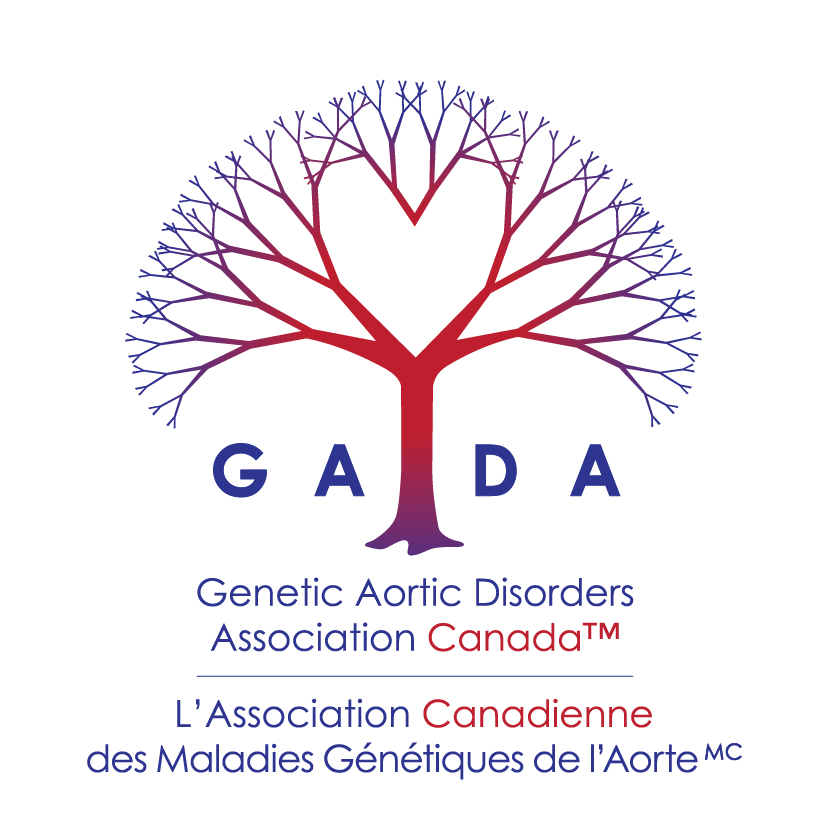GADA Canada Awards $ 205,000 in Research Grants
GADA Canada is proud to announce that it is awarding $205,000 to three physicians/scientists as part of its 2019 Research Grant Award program.
GADA's commitment to promote new research over the last thirty years, has greatly improved our knowledge of the different genetic aortic disorders and is leading to increasingly successful treatment outcomes for affected individuals.
GADA works with patients and the medical community through our support and education efforts. Our commitment to promote new research indeed drives a great deal of this work. We are working actively to secure future research opportunities to make progress in the rapidly-evolving area of genetics and aortic disorders. Many encouraging new research developments are on the horizon.
Since 2000, the Temerty Foundation has awarded over $ 700,000 to 18 research studies through GADA’s research award program. GADA is tremendously grateful to the Temerty Foundation and to all our dedicated members for their continued support and encouragement that has helped us stay committed to promoting new research. Click Here to see GADA-TF funded grants from 2000
New Research We Are Funding: 2019 grants
Alana C Cecchi, MS, CGC, UTHealth, Houston
Clinical and Genetic Determinants of Peripartum Thoracic Aortic Dissection
Alana C Cecchi, MS, CGC (Co-PI)
Rana Afifi, MD (Co-PI)
$ 50,000 / one-year award
Rana Afifi, MD, UTHealth, Houston
Assistant Professors, University of Texas Health Science Center at Houston, Houston, TX, USA
Pregnancy is another factor that increases the risk for aortic dissections. Dissections occurring during pregnancy or in the postpartum period is life threatening to both the mother and the fetus.
Identifying biomarkers for dissections during pregnancy has potential to facilitate prevention. Information produced by this study will be used to start a North American registry for peripartum dissection and develop evidence-based treatment & management guidelines. Read Full Summary
Gauri Rani Karur, MBBS, MD, UHN,Toronto
Cardiac MRI biomarkers of myocardial remodeling and genotype-phenotype correlations in hereditary thoracic aortic disorders
Gauri Rani Karur, MBBS, MD
$35,250 / one-year award
Assistant Professor, Toronto Joint Department of Medical Imaging, Division of cardiothoracic Imaging, University Health Network, Toronto ON.
Recent studies have suggested that there may be subtle abnormalities of the heart muscle in addition to the well-known abnormalities of the aorta and the heart valves in hereditary thoracic aortic disorders (HTAD).
This research study will perform detailed MRI evaluation of the heart to compare HTAD patients to control healthy volunteers and HTAD patients treated with beta-blockers (BB) and angiotensin-II receptor blockers (ARB) to those who are not.
The results of this study will help understand the changes in the heart muscle of patients with genetic aortic conditions and the role of certain medications (BB and ARBs) in protecting it. Read Full Summary
Dianna Milewicz, MD, PhD, UTHealth, Houston
Montalcino Aortic Consortium (MAC) Research
Dianna Milewicz, MD, PhD
$ 120,000
Executive Chair, Montalcino Aortic Consortium, President George Bush Chair in Cardiovascular Medicine, University of Texas at Houston Health Science Centre, Houston, Texas, USA
In 2013, MAC was founded and successfully began to rapidly and efficiently collect vascular disease data from individuals with mutations in hereditary thoracic aortic disorders (HTAD) genes worldwide through the international MAC patient registry. The goal of MAC is to use these data to improve the management and outcomes of these patients through evidence-based treatment guidelines. MAC sites worldwide have provided data on cases with mutations in genes; TGFBR1, TGFBR2, ACTA2, SMAD3, PRKG1 and MYLK.
With the funding from GADA;
MAC will complete a combined analysis of aortic disease of the first 1038 patients in the MAC registry for the following genes ACTA2, PRKG1, TGFBR1, TGFBR2, SMAD3, MYLK.
MAC researchers will also continue to define vascular disease phenotype associated with mutations in the genes; TGFB2, TGFB3 and FLNA.
Determine if vertebral artery tortuosity index (VTI) predicts dissection in TGFB2 and TGFB3 patients.
If aortic dissections are to be prevented, additional biomarkers beyond aortic diameter are needed and the proposed studies will pursue such markers for HTAD cases. Read More
To support our research and progress, please donate here.




